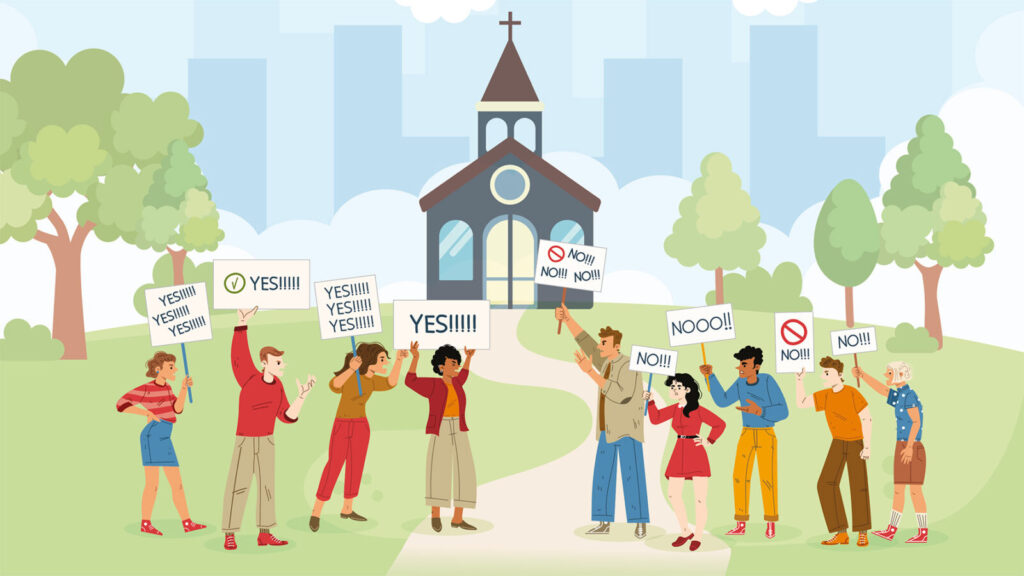During my time at Adventist Record, I’ve noticed a problem brewing at the core of our denomination. You may think I’m referring to the women’s ordination debate, growing tensions around sexuality, or the loss of Adventist “identity”. These are salient dilemmas, but I believe they’re only symptoms of a deeper issue: A widespread disconnect between Adventist belief and practice.
We hold beautiful theology about Sabbath rest (Mark 2:27,28), yet spend our Sabbaths burnt out by countless jobs at church. We believe in spreading the good news of the three angels’ messages (Revelation 14:6,7) yet are riddled with fear and conspiracy surrounding end times. We believe that people should come to God as they are (Psalm 51:16,17) but wear fancy clothes to church and ban certain “sinners” from taking part. We preach that all people are equal in Christ (Galatians 3:28), yet don’t ordain women.
This disconnect between belief and practice goes hand-in-hand with the ever-increasing conservative-liberal divide, and it causes dispute and inaction. Rather than defending the vulnerable (Isaiah 1:17), we sit behind screens arguing that marching for human trafficking wastes time that could be spent spreading the gospel. Rather than nurturing young people to use their talents (Proverbs 22:6; Matthew 25:14-30), we argue about drums and “satanic” music, dashing the Spirit-led dreams of upcoming musicians.
If not addressed quickly, this disconnect between belief and practice may create irreparable damage between liberals and conservatives, Christians and non-Christians, and drive people away in droves. I don’t say this to discourage or complain, but to highlight the problem. Now, I want to propose a solution.
If you’ve dabbled in psychology or cognitive behavioural therapy (CBT), you will know that a person’s thoughts influence their feelings, and in turn, their behaviour. Repeated behaviours build habits. Collective habits build culture. And completing the cycle, the culture a person is raised in impacts their thoughts.
Usually manifesting as self-talk, thoughts like “That person isn’t keeping the Sabbath properly”, or conversely, “Those Adventists are Pharisees”, are informed by the liberal or conservative culture a person grew up in. In turn, these thoughts create current culture by clouding hermeneutics and moral compasses—and so the disconnect, division and inaction continues. We need to break this cycle. This starts with personal reflection.
The more I grow in my relationship with Christ, the more I’m convinced that our core responsibility as Christians is to renew our minds (Romans 12:2); to partner with the Holy Spirit and examine whether thoughts are truly biblical, or merely informed by our cultural context; to let go of the prideful notion that our perspective is right, all the time.
Look at Jesus. He abolished the conservative-liberal divide. He healed on the Sabbath (Mark 3:1-6), stood up for women (John 8:1-11), yet knew the Bible inside out, preached in the synagogue, prayed without ceasing. He followed the Holy Spirit, even if it meant rejecting the collective cultural-religious blueprint. He challenged the toxic thoughts that underpinned the Pharisees’ understanding of scripture, replacing fear with love and freedom for all.
Here’s the hard-hitting reality: the disconnect between belief and practice exists because we uphold an ideology over personal transformation with God. We would rather reject or upset people in order to uphold our often biblically-unsupported, cultural flavour of Christianity, than extend agape love. Even the greatest commandment to love God and our neighbour may be impossible unless we address our prejudices, biases and negative self-talk.
My friends, this is the last editorial I will write for Record, so I wanted to leave you with my greatest, heartfelt plea for our Church before I go. It’s been an honour to work here and meet many wonderful Adventists across the South Pacific. I am grateful for our Church! But having the unique privilege of a bird’s-eye view, I’ve also met too many Adventists who are burnt out, lukewarm or hurting. I believe it’s because we’ve allowed our collective Church culture to overshadow our theology and prevent the Holy Spirit working in and through us. It’s time to renew our minds and be unified. Let’s bring on the second coming!






